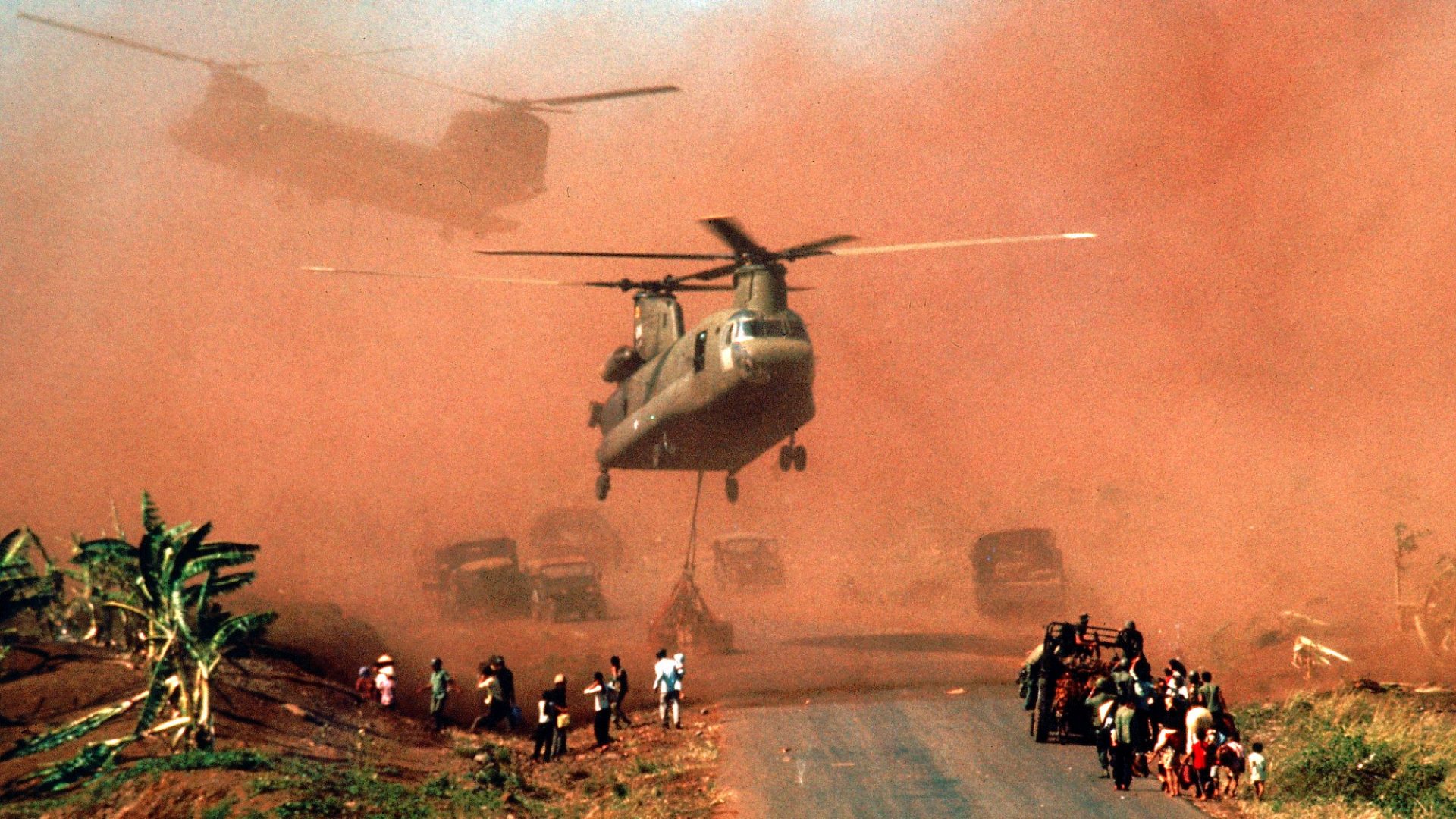Saigon fell to the North Vietnamese Army on April 30, 1975, 50 years ago this month. On that day it was 105 degrees outside and the air conditioning in the US embassy had broken. “At one point we took bags of half-shredded secrets down to the embassy courtyard,” one CIA officer recalled of the rush to get out of the city, “and when the choppers began landing they blew open all of these bags. There was classified confetti all over the trees.”
As his helicopter took off and made for the coast, it came under heavy ground fire. “I kept thinking how ridiculous it would be to be shot down on the way out,” he said.
Vietnam was torn to pieces by war, and millions of its people were killed. More than 50,000 Americans died, and the nightmare of jungle fighting and the psychological blow to national prestige suffered by the United States both still loom over western popular culture. In Saigon the city’s war museums still display the huge amount of military hardware that is the legacy of that time – the tanks, the guns, the bombs.
And as you walk around Saigon – most people still call it that – the question nags at you: what were the Americans doing in Vietnam? Why were they ever there? And how was the great superpower forced out in such a terrible panic, with secret CIA documents left scattered in the wind?
A common explanation was the “domino theory”, the idea that a communist takeover in one country would lead to revolutions elsewhere, and that the US intervened in Vietnam to prevent a Marxist chain reaction across South-east Asia. But there were several consecutive conflicts in Indochina, and domino theory does not explain them all.
Like so many of the other theories that led to the US catastrophe, domino theory turned out to be wrong, and contained in that terrible mis-reading was perhaps the central lesson of Vietnam: that the strength of a nation bears no relation to its capacity for insight. Or put another way, leaders of large, powerful countries don’t necessarily know what they are doing.
They might look as if they do, and they might act with the confidence that comes with vast economic, military and industrial capacity. But if that power is deployed from a position of ignorance – if the superpower becomes enmeshed in a situation that it does not understand – then its advantages fall away to nothing.
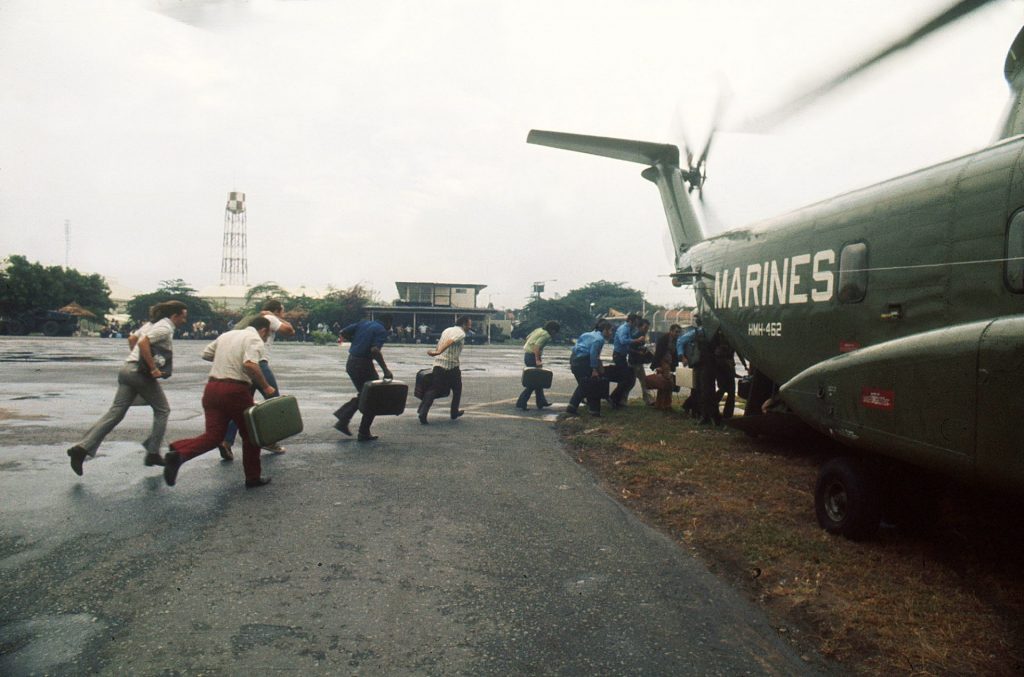
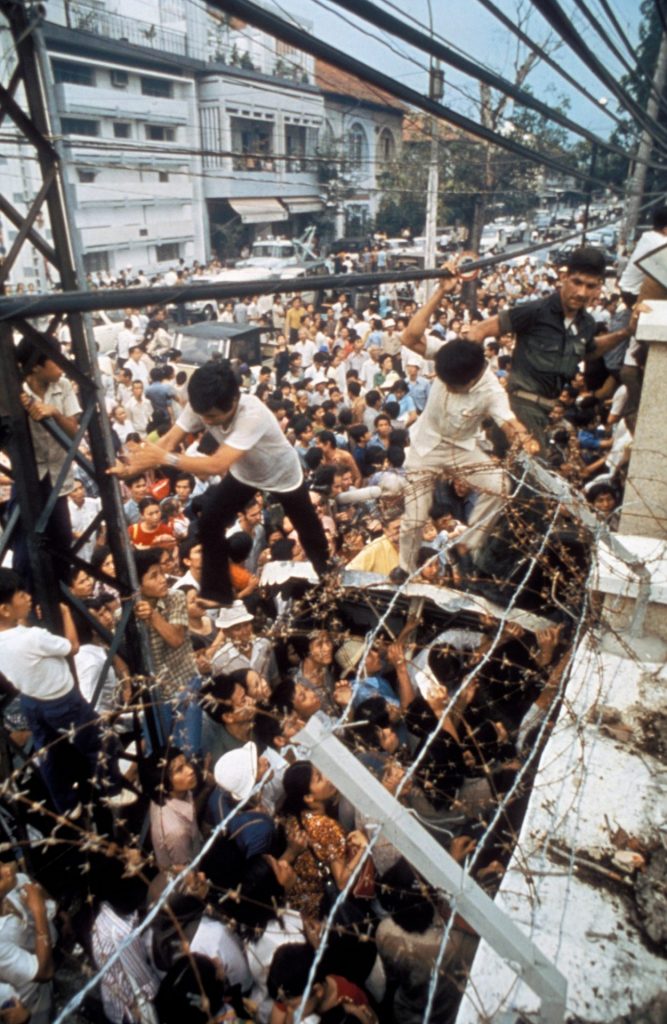

To bring coherence to the American mission in Indochina, president John F Kennedy brought a man into his administration who was widely regarded as an organisational genius, and who had made his name running a vast car company. Robert McNamara had been the CEO of Ford, and his idea was to infuse America’s war machine with the iron logic of the production line. But it didn’t work. The problem was that McNamara, along with the other star intellectuals of the Kennedy era, knew nothing about the people, history, or culture of Vietnam, a fact McNamara later admitted in his 1995 book, In Retrospect: The Tragedy and Lessons of Vietnam.
Donald Trump has also brought a car maker into his administration: Elon Musk, CEO of Tesla, who has sweeping opinions on the war in Ukraine despite knowing nothing about Ukraine or Russia – or even Europe. Like McNamara, Musk appears to see international relations, and human affairs in general, in largely mechanistic terms, just as Trump sees everything in apparently transactional terms.
The result is that the US engagement with the Ukraine war has been conducted in precisely the spirit of ignorance with which America engaged in Vietnam. It seems that Trump doesn’t even seem to understand who started the war in Ukraine. If you don’t even know how a war began, how can you possibly hope to end it?
Saigon is exhilarating. The food is incredible. Every so often, you come across tiny, hole-in-the-wall bars that brew their own beer, and if you can get past the cheesy smell of the home brew, the bia hoi they serve is a pretty decent way to take the edge off the heat.
But around Saigon, and in the towns across the south of Vietnam, the most noticeable thing are the churches. There is a dissonance about seeing those crosses in a region more associated with Buddhism than Catholicism, but once you have noticed them, you are at the beginning of the story.
Christianity arrived in Vietnam in the 16th century, and as the influence of the church grew, so did the French presence. By the mid-19th century the French had taken control of Indochina, an area that included what is now Vietnam, Laos and Cambodia, and though they gave Christianity to Vietnam, like all imperial overseers the French were ruthlessly extractive. The growing Vietnamese nationalism of the early 20th century was given momentum by France’s brutal treatment of the population.
When the Japanese took Vietnam in 1940, the Vichy regime signed an accord with Japan agreeing that the French colonial authorities in Indochina would collaborate with the occupying imperial force. At the end of the war, the Vietnamese nationalists assumed that the French would be thrown out along with the Japanese.
That at least was the assumption when Ho Chi Minh, the nationalist leader, gave a speech to a crowd in Hanoi in 1945, entitled “The Vietnamese Declaration of Independence”, which he delivered from a stage flanked by US army officers. Ho had worked with American forces during the war to rescue downed US pilots from the jungle, and his speech was directed not just at the Vietnamese people, but also at Washington.
President Harry Truman, however, wanted a solid European bloc to stand firm against the USSR. He needed France as an ally – and so Washington allowed the French to re-assert colonial power over Vietnam. It was one of the most grievous and counter-productive misjudgements in US geopolitical history.
That decision triggered the first Indochina war and the French soon learned what the Americans would later come to realise – that fighting in the jungle is one of the most brutal and psychologically destructive forms of combat. Though there were veterans of the second world war among the French forces, this was nothing like the battle for Normandy. The dense, silent rainforest seemed to exert a paralysing terror on those fighting. Soldiers and sometimes entire units would simply vanish, wiped out in the jungle.
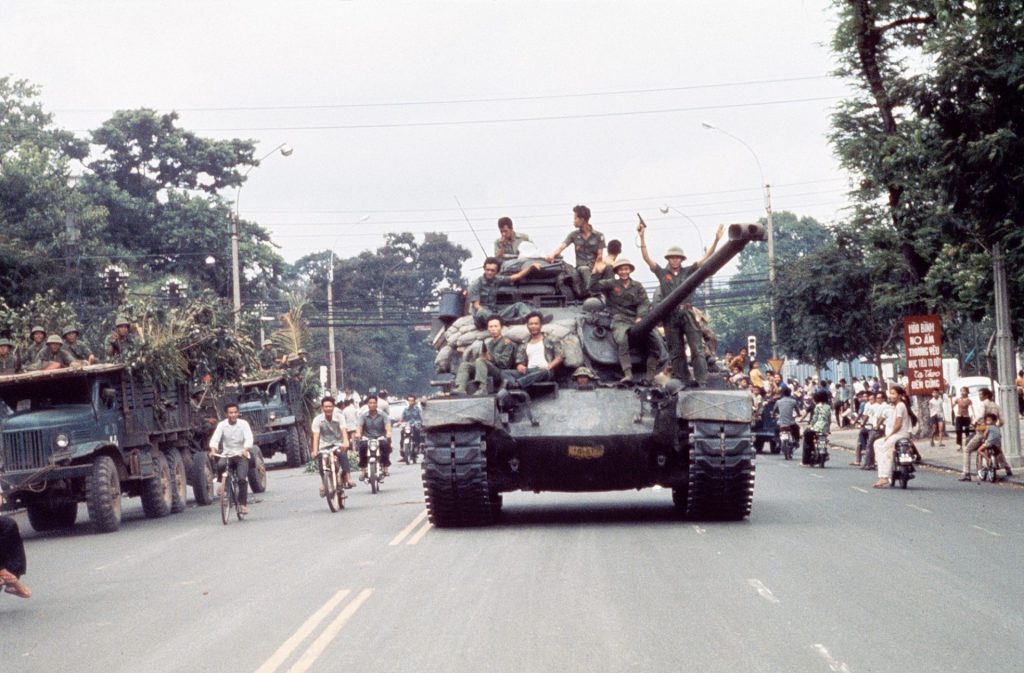
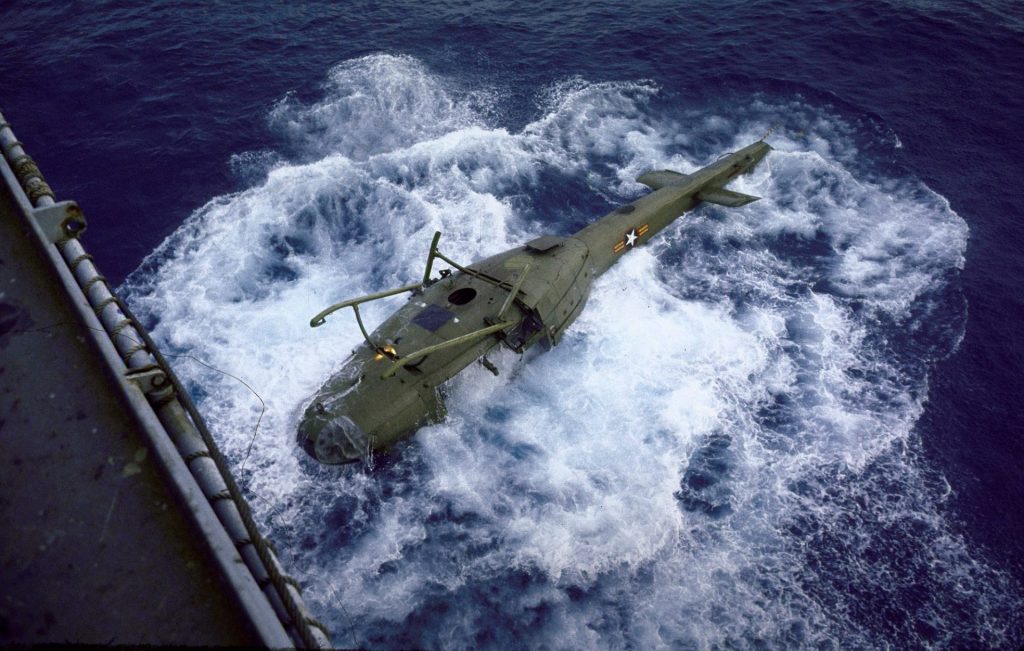
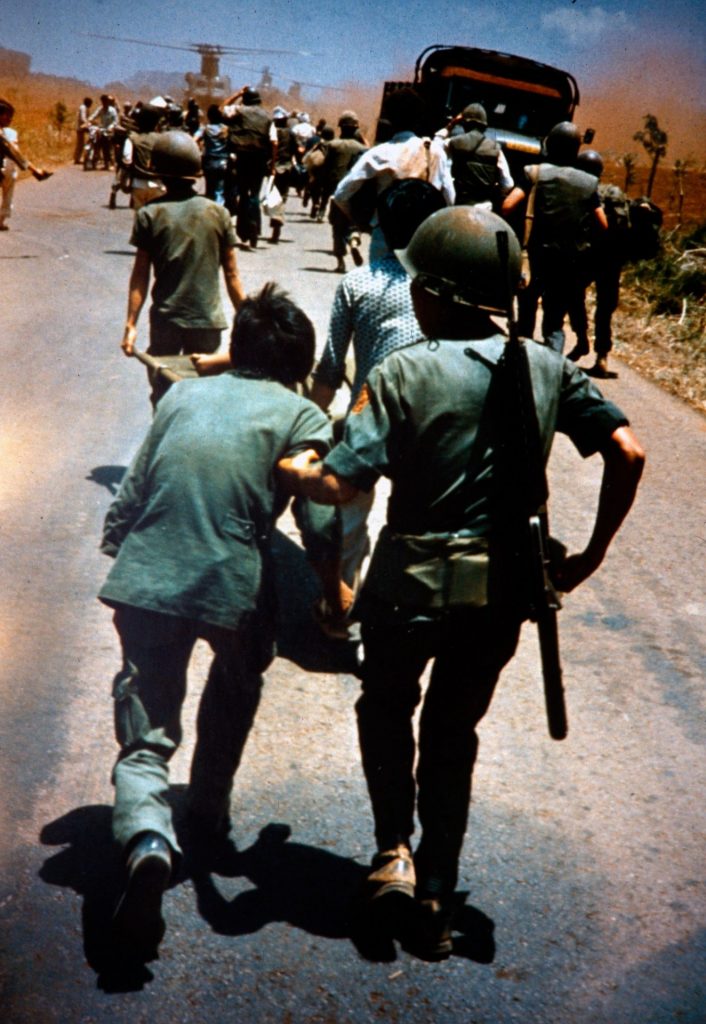
The French presence in Indochina ended in 1954 at the Battle of Dien Bien Phu, a remote jungle base in the far north-west of Vietnam, with two air-strips surrounded by a series of fortified hill-top positions. The French plan was to draw the enemy out into the open for a final decisive battle, a strategy that assumed it was impossible for the nationalists to move heavy artillery through the dense forests. That assumption was wrong.
In his account of that battle, Hell in a Very Small Place, Bernard Fall noted that it was the rainy season, meaning the French napalm could not penetrate the saturated jungle canopy but instead threw up plumes of steam that gave cover for the nationalists. When the first artillery shells started falling on the runways at Dien Bien Phu, the French artillery officer, a man named Piroth, went back to his hut, lay on his bed and pulled the pin from a grenade.
The base at Dien Bien Phu was funded entirely by American money. What’s more, the runways were in the bottom of a deep forested valley, such that only specialist pilots could make the landing – the CIA provided those pilots. Which means that the Battle of Dien Bien Phu was not just a French defeat, but an American defeat, delivered by a new kind of enemy.
Vo Nguyen Giap, who commanded the nationalist forces, remarked that, on confronting France and later the US, “we had to learn how to use inferior means to achieve victory… For 60 or 70 years, the Vietnamese people failed to resolve those issues. They were courageous, but that wasn’t enough. Then we learned the secret method of people’s war. Thirty million people provide thirty million soldiers.”
After the French defeat, Vietnam was divided into a Communist north centred around Hanoi, and a US-aligned south, with its capital in Saigon. As the Americans took over, there were attempts to forge a new society in Vietnam, and an account of that effort is given by the former CIA officer Rufus Phillips in his book, Why Vietnam Matters. The rural affairs programme that he ran was perhaps the one moment when the US attempted to win in Vietnam by non-military means.
But the idea of improving people’s lives was trampled by the mechanical brutality of production-line warfare: that if we kill more of them than they kill of us, we will inevitably win. Phillips, who was in Vietnam from 1954 to 1968, writes: “At the highest levels we approached the Vietnam conflict with excessive hubris, convinced we knew best how to win, with little understanding of the enemy or of our South Vietnamese allies. We became obsessed with bi-army war when the real war, a people’s war – mainly political and psychological in nature – went largely unnoticed.”
The US lost that political and psychological war, and withdrew its final military units from Vietnam in 1973, leaving the southern Vietnamese to fight alone. Just as with the US withdrawal from Afghanistan, it didn’t work. In the early months of 1975, as the communist army advanced further south, Frank Snepp, a CIA officer, recalled seeing southern Vietnamese troops “literally racing into the surf off Danang. They were throwing their arms away and swimming for safety. It was total, utter panic.”
The shells started landing on the outskirts of Saigon on March 29, 1975. “Americans were cramming friends into aircraft. They were lovers, housemaids, friends, but not necessarily the people in the greatest danger.”
Snepp was in the CIA operations room and heard the radio messages coming in from South Vietnamese agents across the country. “Please come get us, we’re gonna die, we’re gonna die,” one of them said.
“I discovered that the CIA agent assigned to make sure they were evacuated had evacuated himself,” Snepp recalled, “and left them all at the CIA hotel.” Most of the people in that hotel were machine-gunned by the advancing communists. “In many ways the war ended just as it had been conducted by the Americans,” Snepp said, “with an often total disregard for the lives at stake.”
The nationalist army took Saigon on April 30. Thirty years after Ho Chi Minh had given his Declaration of Independence, his army finally achieved victory. Millions of people fled the country, and many who stayed were put into re-education camps.
Snepp managed to get out, but shortly before he departed, he learned that the Vietnamese woman with whom he had been in a relationship had killed both herself and his baby for fear of reprisals. “As I came off the roof of the embassy,” he said, “I was overwhelmed with this numbing guilt.”
Vietnam now is a beautiful, welcoming place. The people in Saigon aren’t anti-western, or if they are they don’t let on. Trump’s tariffs might have changed that somewhat.
But then – the Vietnamese won. And having beaten the French and then the Americans, they went on to defeat the Chinese in a short conflict in 1979 that arose from the Vietnamese invasion of Cambodia. They are the only nation to have defeated three sitting members of the UN security council. The Vietnamese remember all this.
But here in the west, things are a little different. We tell a different story, a tragic account, set to the riotous nihilism of The End, the Nietzschean bedlam of the Ride of the Valkyries and the punishing grief of Barber’s Adagio for Strings. And how can history ever hope to compete with any of that?
It seems that, especially when it comes to Vietnam, it cannot. “The missing political and psychological component of the Vietnam war,” Phillips wrote, “remained buried in the rush to forget about the whole thing.”


